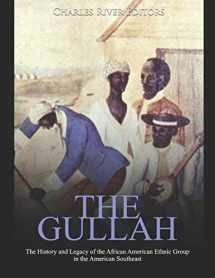
The Gullah: The History and Legacy of the African American Ethnic Group in the American Southeast
Book details
Summary
Description
*Includes pictures
*Includes a bibliography for further reading
"If you do not know where you're going, you should know where you come from." - Old Gullah Proverb
Charming drawls, bluegrass bops, NASCAR, mouthwatering barbecues, and the Great Smoky Mountains are all customs that make America's Deep South home to some of the most vibrant, powerfully evocative, and culturally rich subregions on the continent, tethered to a heritage that rose from the ashes of the Civil War. There exists, however, a lesser-known, but equally indispensable subculture based within a 500-mile radius of the coastal South Atlantic states and Sea Islands. These culture bearers, who refer to themselves as the Gullah Geechee, or the "Gullah" for short, are the descendants and rightful heirs of the once-shackled slaves who resided in these parts. As the guardians and torch holders of the incredible legacy left behind by their persevering ancestors, the modern Gullah spare no effort in preserving the inherently unique customs and traditions, complete with their own creole tongue, that have been passed down from one generation to the next.
Of course, the first Gullah people were not natives of the Deep South, nor were they eager immigrants who willingly crossed the North Atlantic in the hopes of landing opportunities available only in the "land of the free." Rather, the Gullah were normal, everyday people who were forcibly extracted from their homes and shipped like chattel to a foreign land, where they were sold, purchased, and put to work on plantations, mines, factories, and elsewhere. Simply put, they were an ill-starred, yet fiercely diligent people who made the most out of their unimaginably horrific fates, constructing their own colorful customs and a remarkable legacy for their future successors.
A number of notable figures have been linked with the Gullah in recent years. Michelle Obama, for instance, is said to be a descendant of a Gullah slave who once dwelled in a cotton plantation in the Low Country region of South Carolina. Little Melvinia was no older than eight when she arrived at the plantation of one Henry Wells Shields, soon after adopting the surname of her "master," as per the customs of the mid-19th century. A teenaged Melvinia was ripped from her home once more in 1852 and relocated to Georgia, and it was there that she was impregnated by a white man and gave birth to the great-great-grandfather of the former First Lady. South Carolinian boxing icon Smokin' Joe Frazier and Cleveland Browns legend Jim Brown of St. Simons Island, Georgia also share Gullah blood.
The Gullah: The History and Legacy of the African American Ethnic Group in the American Southeast examines the origins of the people, their culture, and how their history has winded over the centuries. Along with pictures depicting important people, places, and events, you will learn about the Gullah like never before.


We would LOVE it if you could help us and other readers by reviewing the book
Book review



